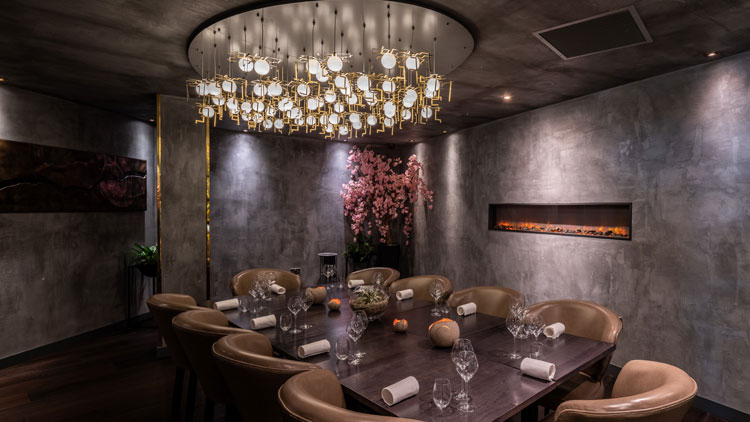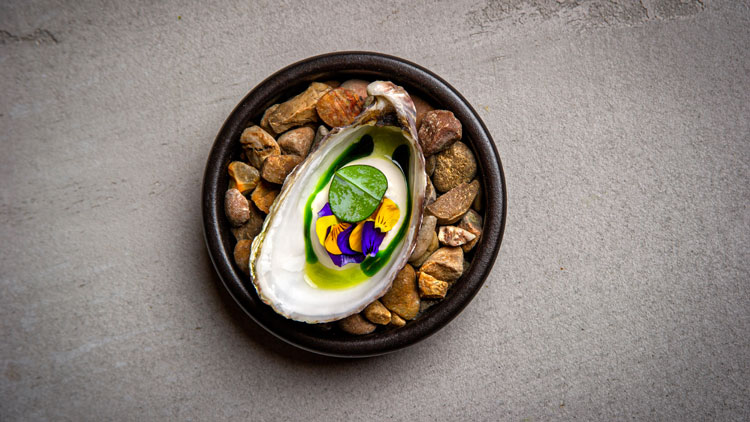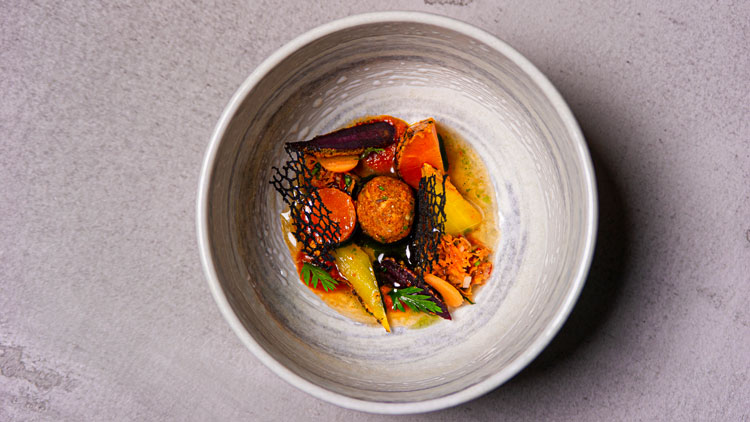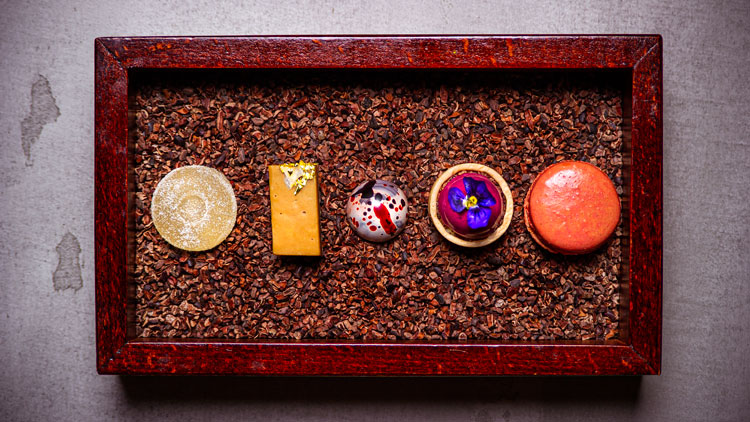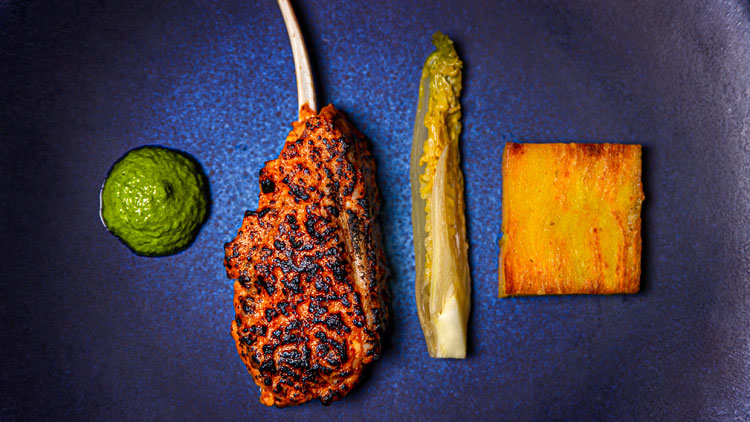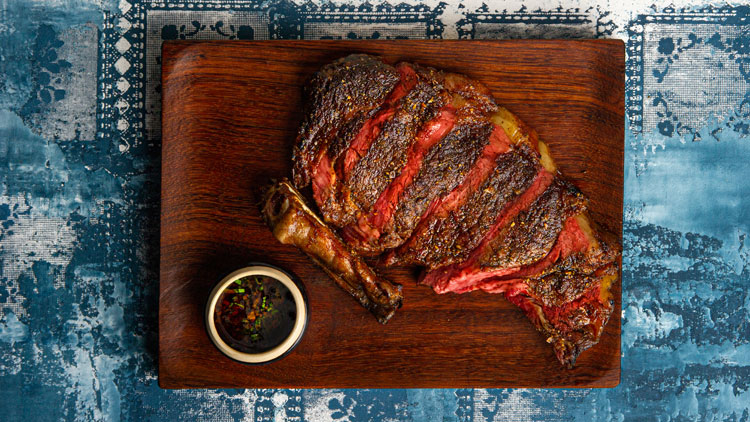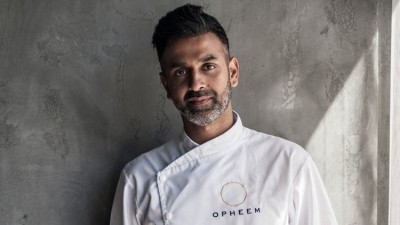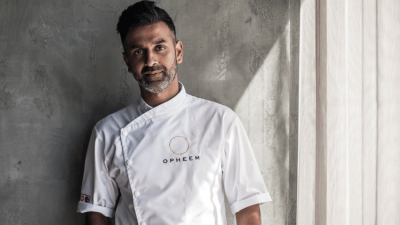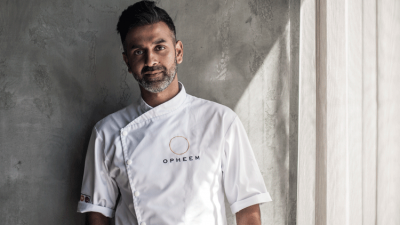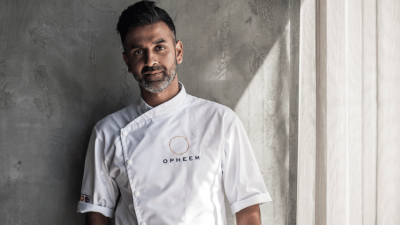Aktar Islam: “Cooking is an open language”
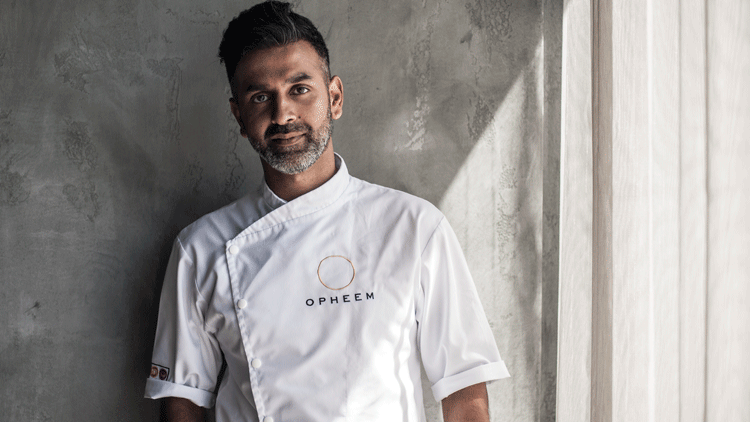
By his own admission, Aktar Islam’s signature dish of achaari Pink Fir potatoes with tamarind is a very complicated plate of food. In fact, it is difficult to imagine a more involved dish in which a potato is the star of the show.
Our server simply gives us the highlights and instructs us to dig deep to get every element in each mouthful but the dish – which is inspired by the popular Indian street food aloo tuk – sees potatoes waterbathed, grilled, put through an espuma gun and deep fried in no less than three different ways (as crisps, pillows, and croutons).
Binding it together and providing a rush of sourness, spice and chilli heat is a tamarind chutney and a tempered yoghurt marinade made using pickling masala. The result is a truly awesome plate of food that feels distinct from what is served at top-end Indians in London.
The reason for this, Islam says, is that’s he’s not an Indian chef. “I’m a Brummie," he says. "Yes, I had a bit of a head start as my family’s heritage is Bangladeshi and I grew up in British curry restaurants, but my understanding of Indian food comes from studying and travelling rather than my cultural upbringing.”
As he rightly points out, most chefs cooking top-end Indian food in the UK were born in India and were trained at either The Oberoi Group or Taj Hotels prior to arriving on these shores. Though there has been significant evolution over the past decade or so - most notably from Gymkhana, Trishna and Bibi-owner JKS Restaurants - Michelin-starred and star-chasing Indian chefs tend to have a similar mindset, both in terms of what’s on the plate and the overall restaurant experience they provide.
Cut from a different cloth
With a minimalist kitchen that looks more like that of a Spanish three-star than an Indian restaurant, Islam’s Jewellery Quarter restaurant Opheem is cut from a different cloth.
“This is one of the nicest and best equipped kitchens in the country, irrespective of cuisine,” says Islam, who is currently the only British-born chef to attract a Michelin star for cooking Indian food (the London-born JKS co-owner Karam Sethi was at the stove at both Trishna and Gymkhana when they first won their stars). Opheem is also the first and only non-London Indian restaurant to win a star in The Michelin Guide Great Britain & Ireland.
“We don’t have a tandoor anymore; I prefer working on a konro (a small Japanese charcoal grill) because it gives us more control. The kit in here is a combination of state of the art and very basic.”
Opheem’s three menus – a £115 10-course tasting, a £95 five-course tasting and a two and three course set lunch priced at £45 and £55 respectively – are constructed around the same top-quality produce used by Birmingham’s other Michelin-starred restaurants.
“Spices support, but ultimately produce is king. That’s another big difference to other Indian restaurants. The way we cook is the way we cook, it's not a rendition of anything anyone else does. It’s my interpretation of thousands of years of Indian culinary heritage, which I use to create flavours that smack you in the face.”
Fighting talk indeed. But the 41-year-old delivers, with dishes that showcase an impressive understanding of classic and contemporary cooking techniques. Plump scallops are crusted with tandoor spices, cooked delicately to semi-translucent and served with a cream split with spiced charcoal oil, while a dish of cod and chanterelles is served with a fragrant korma-inspired sauce that is about as far away as those served in Anglo-Indian restaurants as one could imagine.
On the tasing menu at least, the closest Opheem comes to serving a curry proper is a venison bhuna that’s expertly packed into a roasted onion and served alongside a perfectly-seared piece of venison and a rich sauce that owes more to France than it does the subcontinent.
"The idea that only Indian chefs with a wealth of knowledge and culinary heritage and the right skin tone can cook Indian food at a high level is absolute bullshit"
If that sounds a bit fiddly and overwrought it’s anything but, with the ample serving of bhuna packing the kitchen’s trademark punch and proving that Islam certainly knows what he’s doing when it comes to more traditional Indian cooking.
Another thing that sets Opheem apart from nearly all other top-end Indian restaurants is who is in the kitchen. Opheem has a team of about a dozen chefs and only one of them is Indian.
"The idea that only Indian chefs with a wealth of knowledge and culinary heritage and the right skin tone can cook Indian food at a high level is absolute bullshit," he insists. "I've got 20-year-old kids that grew up in Walsall cooking amazing Indian food.”
Though he won’t name names, Islam says that a few top Indian chefs have taken issue with this viewpoint and his restaurant’s success more generally. “They think I have no business cooking Indian food at this level. “It's like telling Gordon Ramsay he can't cook French food. He'll tell you to fuck off."
Blood, sweat and tears
The eldest of five sons, Islam was born into the restaurant industry. Starting out washing pots and peeling onions at his father’s Solihull restaurant India Palace at 13 he soon found he much preferred it to his studies.
“I got kicked out of school soon after,” he recalls. “It just wasn’t for me. I was much happier working alongside people who were two or even three times my age. My parents were devastated because they had much loftier ambitions for me. I don’t begrudge them for that. This industry is literally driven by blood, sweat and tears.”
Rapidly, he marked himself out as an employee that was able to push himself, making it his goal to work harder and faster than anyone else within the various Indian kitchens he passed through.
“I find it odd that some of these places market themselves as Bengali restaurants. I understand the importance of regionality, but they need to call a spade a spade"
“The pots were done by hand in in those days. I’d get through them quickly to help with the prep. I made it my goal to be faster and better than everyone around me. My decision to work in kitchens caused my parents a lot of pain initially but now I’ve come good it’s fine.”
Nearly all the places Islam worked have been Bangladeshi owned but served the familiar curry house fare for which Birmingham is famed. “I find it odd that some of these places market themselves as Bengali restaurants. I understand the importance of regionality, but they need to call a spade a spade. They’re British curry restaurants that serve food that’s far removed from what you get in Bangladesh. The dishes we got at home were more brothy and acidic with a lot of herbal notes.”
Taking a break from curry
It wasn’t long before Islam realised that in order to progress his career, he would need to move on from curry houses. He took a job at an upmarket Italian restaurant called Quad that would prove to have a surprisingly big impact on the direction the then 18-year-old chef’s career would take.
“At that point my understanding of Italian food was largely based on Pizza Hut. But here the chef was flying in tomatoes from Italy every day and using bright green olive oil,” says Islam, who soon learnt that when it comes to Italian food the less you do to good ingredients, the better. “The mindset is different to the Indian kitchen, which uses a lot of different ingredients and processes. It totally changed the way I looked at cooking.”
At just 21, Islam opened his first restaurant. On the former site of India Palace, Karma created a fair bit of buzz, with the young chef stripping the space back and taking it from 70 to 40 covers to create a more sophisticated take on the British curry house.
“It was still mainstream as I did not want to put people off but I used good ingredients and moved away from heavy onion-based sauces. We had a waiting list at the weekend, which was unheard of for a little Indian restaurant in Solihull,” recalls Islam, who alongside more familiar curry house dishes offered a handful of more ambitious, modern dishes that were more in line stylistically with what Opheem now serves as well as some authentic Bangladeshi dishes.
In 2003 he started working with Jabbar Khan at Lasan Group. Although in most cases he attempts to be diplomatic, it’s clear there is no love lost between these two Birmingham-based entrepreneurs.
“We did not share the same values. In fact, our ideals were diametrically opposed,” says Islam, who was originally brought onboard to oversee the group’s flagship Lasan, which is about five minutes down the road from Opheem. He left after stabilising the restaurant but returned to the group as a director and co-owner a few years later as growth at the top-end Indian stalled.
A factor in his return to the James Street restaurant was Gordon Ramsay’s The F Word television programme, which was looking to include Lasan in its search for the UK’s best local restaurant.
Islam wasn’t that keen initially, but his participation and eventual victory in the competition set him on the path to becoming one of Birmingham’s best-known chefs (he has since appeared on a string of TV programmes, most notably Great British Menu).
His increased profile and seemingly limitless drive led to a number of other restaurant projects for Lasan Group, including Lasan Eatery (now Raja Monkey), Argentine restaurant Fiesta Del Asado, the New York-inspired Nosh & Quaff and Izza Pizza.
Going solo
Despite the success enjoyed by Islam and the group there was significant friction behind the scenes. In 2017 Islam parted ways with Khan and opened Opheem in 2018. The star arrived a year or so later, which he regards as validating his high-end take on Indian cuisine.
“I see our star as a big win for all chefs because it shows that the colour of your skin and your second name does not dictate your journey in life. Cooking is universal. It is an open language. People should be allowed to explore things regardless of their culinary heritage.”
Since then he has quickly looked to expand his empire. In late 2018 he opened high-end Italian restaurant Legna moments from Opheem but the site closed suddenly in January 2020 due to concerns over the cladding (the building is still covered in scaffolding). Reopening in that location has been ruled out but Islam says he intends to reopen the restaurant in a different location.
"I see our star as a big win for all chefs because it shows that the colour of your skin and your second name does not dictate your journey in life. Cooking is universal"
Just a few weeks after Legna closed its doors (and just ahead of the pandemic) Islam opened Argentine restaurant Pulperia in Brindley Place. Serving a tight menu centred around top-quality beef from all over the world, the restaurant has been extremely well-received (it recently chalked up a glowing review from The Sunday Times critic Marina O’Loughlin).
So why has a Birmingham-chef with Bangledeshi heritage now put his name to two Argentine restaurants? There’s actually a sound reason: Islam was up against Battersea restaurant Santa Maria Del Sur on The F Word final and became close friends with its then chef Ernesto Labrada.
“I’ve been out with him to Argentina a few times. I’m a big fan of steak and red wine so I love it out there. I’m so into it that some of my mates call me Argent-Indian.”
Launching Aktar at Home
Like many of his peers, Islam launched a nationwide meal kit service during the pandemic. Aktar at Home initially offered straightforward Indian dishes alongside English roasts, but the latter offer has been paused due to the spiralling cost of beef. Despite this setback, it’s been a big success. Though unwilling to talk numbers he says the self-contained unit in trendy Digbeth employs 18 people full time and around half that part time.
“But we don’t make a huge amount per box. It's mainly there to generate jobs. Youth unemployment is a big issue for us in Birmingham. I grew up in Aston (one of the city’s rougher areas) so I know about the challenges these kids face. Many of them have never worked anywhere before, let alone a kitchen. But it’s not Opheem at Home. It’s traditional home-cooked Indian food made with great ingredients.”
With Aktar at Home Islam has created an unusually top-light kitchen structure that sees a few experienced chefs lead a large group of inexperienced young cooks. This approach is somewhat mirrored at his flagship, with the chef-patron generally preferring to employ people that are early on in their careers.
"Investing in young people is great but you need someone to lead them. We have a very strong senior team but we don't want to spread ourselves too thinly"
“Staffing has always been tough in Birmingham. There are a lot of people in their 30s that have been in the industry for quite a few years, working in chains and places where it's all about food regeneration [not cooking]. They don't know how to cook and, on top of that, they have picked up a lot of bad habits.”
While this tactic has served the group well, the lack of suitable senior people to lead kitchen teams is now starting to hold it back. Islam currently has two projects on ice: a quality fitness food brand (he’s a big fan of the gym) and an-as-yet unrevealed restaurant project in Birmingham’s affluent Edgbaston suburb for which he has already acquired and partly fitted out a site.
“Investing in young people is great but you need someone to lead them. We have a very strong senior team, but we don’t want to spread ourselves too thinly,” says Islam, who has also recently been linked with major hotel projects in both Birmingham and Nottingham but has now ruled out any further openings “until the world returns to normal”.
But things are set to change at Opheem early this year, with the restaurant’s large bar and lounge area currently being ripped out. He is coy about what will replace it but says the aim is to create a more immersive restaurant experience. His references to the guest journey suggest that diners might move through different zones of the restaurant as they eat (the space is big enough to accommodate this).
“I want to continue to invest in the city. My entire life has played out here," says Islam. "It’s weird as I’ve always seen myself as the young guy, but I’m now 28 years into my career."
But with Opheem having traded for only two years due to the pandemic and several other projects in the offing, it seems he is only just getting started.
